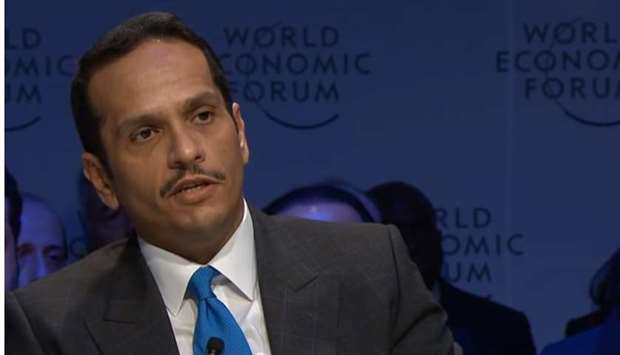The Gulf crisis has paralysed the ability of the GCC to contribute to peace and be a force for stability, HE Sheikh Mohamed bin Abdulrahman al-Thani, Deputy Prime Minister and Minister of Foreign Affairs, Qatar on Tuesday said.
Participating in a panel discussion on 'Peace and Reconciliation in a Multipolar World', on the sidelines of the World Economic Forum in Davos, Sheikh Mohamed said: "My country has this geopolitical conflict right now with three of the Gulf countries, which really paralyses the ability of the GCC to contribute to peace and be a force for stability as everybody expects – because the GCC in itself…it’s a strength when it is a bloc. But when you have each country acting separately, it has no power. It has nothing to do. And the GCC itself, as an organisation, as a regional organisation that proved it was the only successful model in the Arab region…unfortunately, now it appears that it was not successful in solving its own conflict."
Answering a question as to what extent can a country like Qatar play a constructive role in peace and reconciliation today in the new geopolitical context that requires alternative approaches to peace and reconciliation, he said: "We need to look at those regional mechanisms that should support peace and reconciliations in other countries but should also make sure that these regions staying together have a clear understanding of the needs of co-operation and the needs of dispute resolution.
"Right now, it has been almost 20 months since the blockade of Qatar (started) and nothing has been achieved by the GCC as an organisation. So, it’s becoming very complicated and we need, as a region, to have ownership – but we need to act with good intention and good faith at the beginning."
Sheikh Mohamed said: "We are living in a very complicated situation right now in the region. Qatar has been taking a different approach in foreign policy and it has been very successful in the last decade and it is proven in different areas of conflict. One of the examples is Darfur, where Qatar brought peace. Lebanon, where they had disagreement about the president, and they agreed to elect the president when they had the Doha Agreement. Other conflicts where Qatar is progressing include Afghanistan .... Qatar had this unique position because of its size, its ability to move, and talk to all the parties in their conflicts. And we try to utilise these resources and capabilities for the good, for bringing peace and reconciliation in these countries.
"But if the countries themselves are not entering and engaging the peace processes with good intentions, you cannot impose peace. We are just acting as a facilitator and mediator. But the main players are the parties of the conflicts. What you want to get from the facilitator – whether a country or an organisation, a regional, sub-regional or international organisation is just as important – it’s just the facilitation. And the main process should be driven from inside.
"Here what happened in Lebanon, when you talk about the success story, because the process was driven from inside and facilitated by other friends and allies. Now, looking at it also from another perspective, when you look at those domestic conflicts, it all has a regional and geopolitical dimension."
Among the other panelists were Abdullah Abdullah, chief executive of Afghanistan; Sigrid Kaag, Minister of Foreign Trade and Development Co-operation, the Netherlands; Gebran Bassil, Foreign Minister of and Abdelkader Messahel of Algeria.

,Qatar has been taking a different approach in foreign policy and it has been very successful in the last decade and it is proven in different areas of conflict,, said HE Sheikh Mohamed bin Abdulrahman al-Thani
